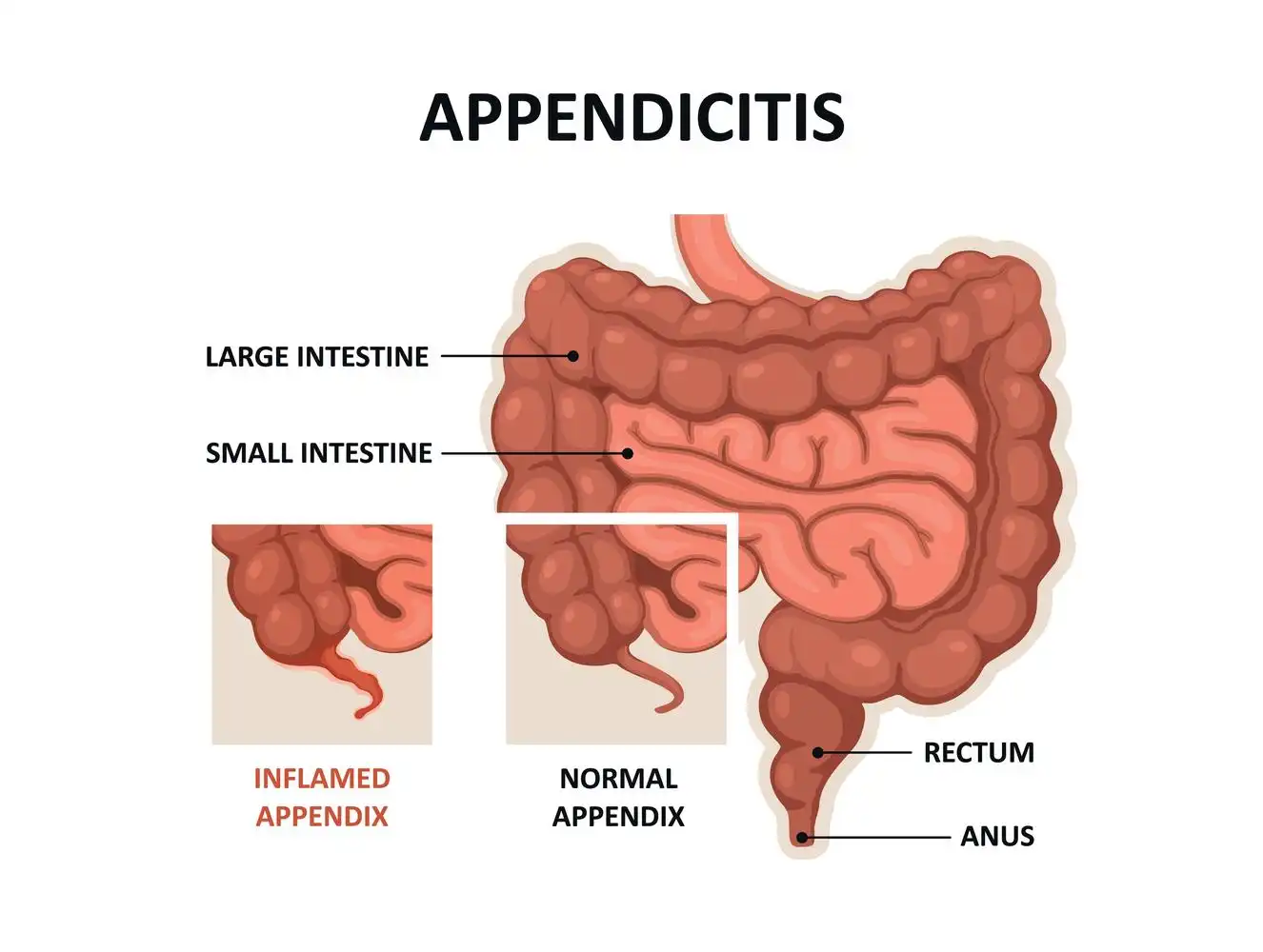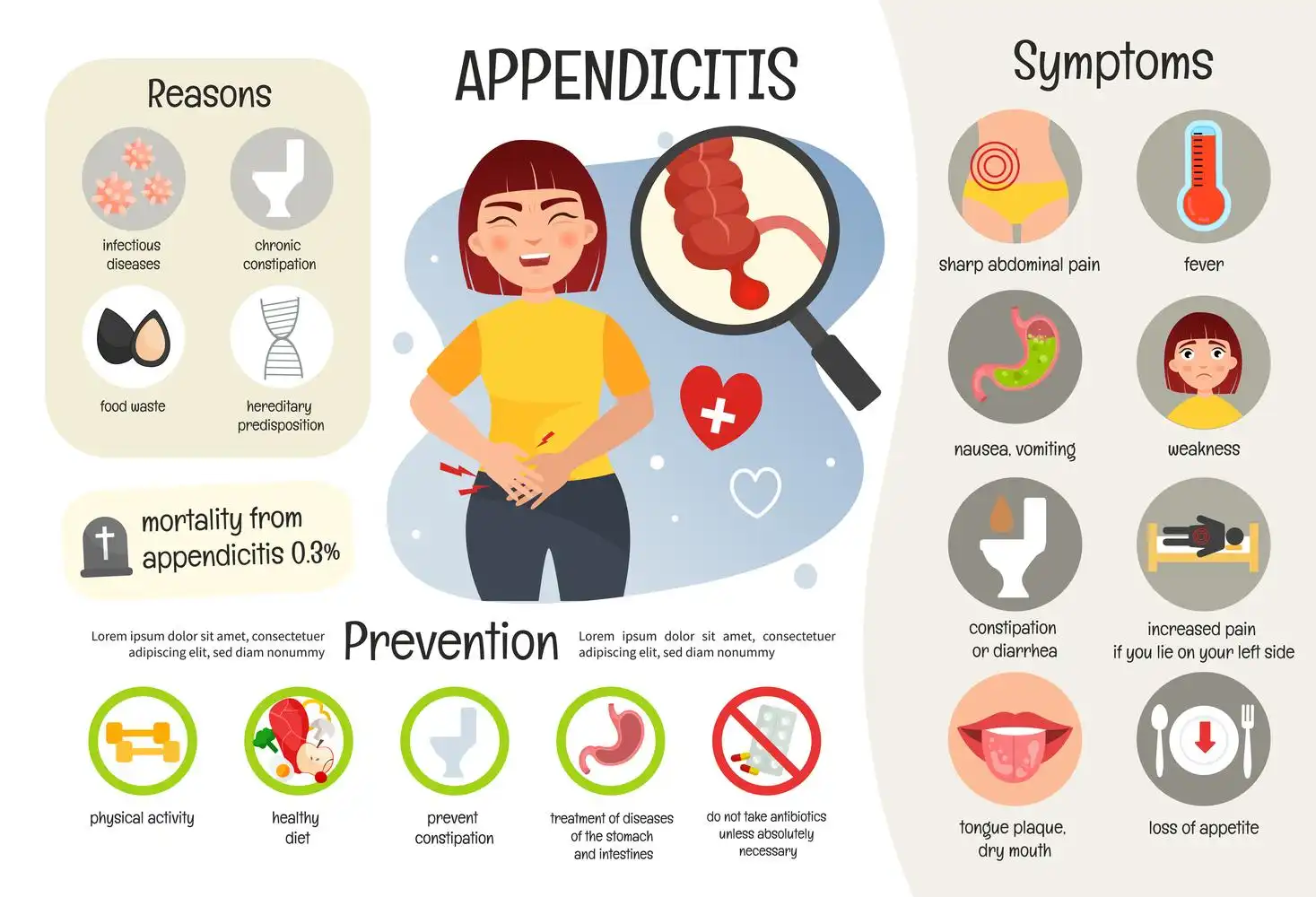Introduction
The appendix is a small, finger-shaped organ that extends from the large intestine. It is believed that the appendix does not serve any important purpose in the body. Appendicitis is a medical condition that occurs in which the appendix becomes inflamed, swollen, and filled with pus. This can happen to anyone, but it is most common in people between the ages of 10 and 30.

Causes of Appendicitis
The specific cause of appendicitis is unknown, however, it is thought to occur when the appendix becomes blocked, which is usually due to stool, a foreign material, or cancer. This blockage can lead to bacterial growth, which can cause inflammation and swelling of the appendix. Other factors that may contribute to the development of appendicitis include genetics, age, and a weakened immune system.
Symptoms of Appendicitis
The most common symptoms of appendicitis include:
- Abdominal Pain: The pain usually starts near the belly button and can be severe and sudden.
- Loss of Appetite: Those suffering from appendicitis may experience a loss of appetite and may not feel like eating anything.
- Nausea and Vomiting: Appendicitis can cause nausea and vomiting, especially when combined with other symptoms.
- Fever: Appendicitis can cause a low-grade fever.
- Diarrhea or Constipation: Some people with appendicitis may experience changes in their bowel movements.

Process Appendicitis Diagnosed?
A physical exam, blood tests, and imaging studies are typically used to diagnose appendicitis. A press on the lower right side of the abdomen during the physical exam by a doctor use to check for pain or swelling. Blood tests may be performed to look for symptoms of illness, such as an increased white blood cell count. Tests like ultrasound or CT scan, may be done to confirm the diagnosis and check for complications.
What is the Treatment for Appendicitis?
The most common treatment is surgery, which involves the removal of the appendix. The surgery is called an appendectomy and is usually performed as an emergency procedure. During the surgery, a small incision at the lower right side of the abdomen is done to remove the appendix. In some cases, antibiotics may be prescribed to help fight the infection and reduce inflammation.
After the surgery, patients are advised to rest and avoid any strenuous activities for a few weeks. Patients should also avoid lifting heavy objects, driving, or performing any other activities that could put pressure on the incision site. Full recovery can take several weeks, but most patients can return to their normal activities within a month.
Complications of Appendicitis
Although appendicitis can usually be treated with surgery, some potential complications can arise if it is not treated promptly.
Here are some of the complications of appendicitis:
- Ruptured appendix: If appendicitis is not treated promptly, the appendix can burst, leading to a serious infection in the abdomen. This is a life-threatening complication that requires emergency medical attention.
- Abscess: It is a collection of pus that can form in the abdomen as a result of a burst appendix. It can cause fever, abdominal pain, and other symptoms. Treatment for an abscess typically involves draining the pus and antibiotics.
- Peritonitis: Peritonitis is a serious infection of the lining of the abdomen that can occur when the appendix bursts. It can cause fever, severe abdominal pain, and other symptoms. Treatment for peritonitis typically involves hospitalization, intravenous antibiotics, and surgery to remove any infected tissue.
- Bowel obstruction: In some cases, a blockage in the intestine can occur as a result of appendicitis. This can cause symptoms such as abdominal pain, nausea, vomiting, and constipation. Treatment may involve surgery to remove the blockage and any damaged tissue.
- Fertility issues: In rare cases, untreated appendicitis can lead to infertility in women. This is because the infection can spread to the fallopian tubes and ovaries, causing scarring and damage.
Prevention of Appendicitis
There is no guaranteed way to prevent appendicitis. However, there are several steps you can take to reduce your risk of developing appendicitis or experiencing complications from it:
- Eat a healthy diet: Eating a well-balanced, nutritious diet can help reduce your risk of developing appendicitis. It is also important to avoid consuming large amounts of high-fat or high-sugar foods, as these can be harder for the body to digest.
- Stay hydrated: Adequate hydration can also help keep your digestive system functioning properly and prevent infections.
- Get regular exercise: Engaging in regular physical activity can help keep your body healthy and reduce your risk of developing many types of illnesses, including appendicitis.
- Seek prompt medical attention for any abdominal pain: If you experience any symptoms of appendicitis, it is important to seek medical attention as soon as possible
Conclusion
In conclusion, appendicitis is a common medical disorder that, if neglected, can lead to serious complications. It’s crucial to get medical help right away if you develop any appendicitis symptoms, such as fever, nausea, vomiting, appetite loss, or abdominal discomfort. Early intervention can lessen the risk of significant consequences and increase your chances of a complete recovery.
Frequently Asked Questions
1. What to do if I think I have appendicitis?
If you are experiencing symptoms of appendicitis, you should seek medical attention right away. Delaying treatment can lead to serious complications.
2. The Appendix is a Vestigial Organ for what reason?
The appendix is commonly believed to be a vestigial organ, meaning it no longer serves a useful purpose in the human body. While it was once thought to have no function at all. However, the appendix can still be removed without causing any harm to the body, and many people live perfectly healthy lives without their appendix.
3. Can appendicitis go away on its own?
No, appendicitis cannot go away on its own. It requires prompt medical attention to prevent serious complications.
 Mission Statement
Mission Statement
“Empower every student to achieve full potential”
88Guru has been established with the social objective of making quality video-based learning material available to all Indian students. Technology, Connectivity and Social Media are rapidly changing the world of Education and we wish to lead the transformation of the tuition industry in India.
88Guru is the perfect complement to the current tuition model. 88Guru creates a wonderful opportunity for children and parents to bond while engaging in a valuable learning activity. It also provides the complete curriculum at your fingertips for those moments when you need some help at short notice. We believe that this mode of tuition could be transformational, adding hours to a child's day while providing complete control over the learning process.
Every course is taught by the best teachers from India's top schools and conducted in an engaging manner to keep students involved. The e-learning process consists of video-based instructions, computer-graded assignments, and a dashboard which allows the student and parent to track progress.


